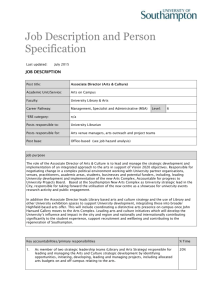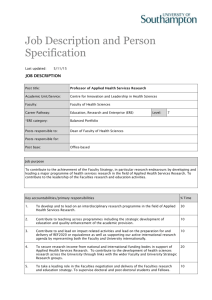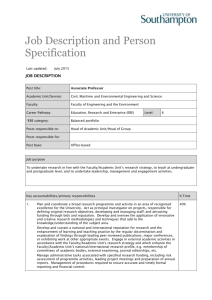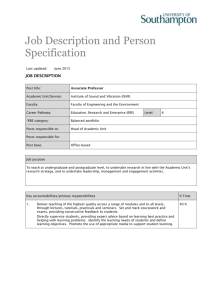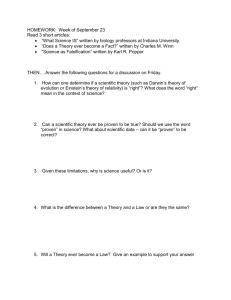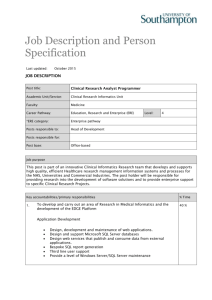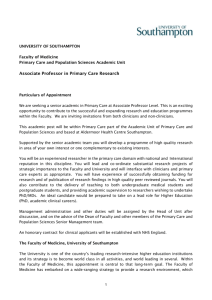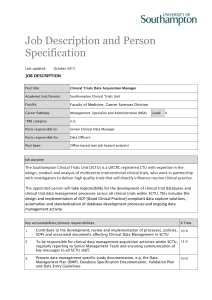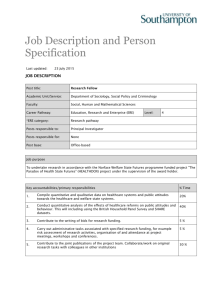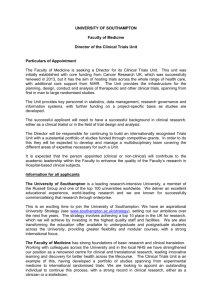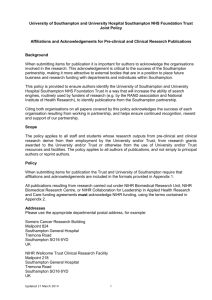Job Description and Person Specification
advertisement
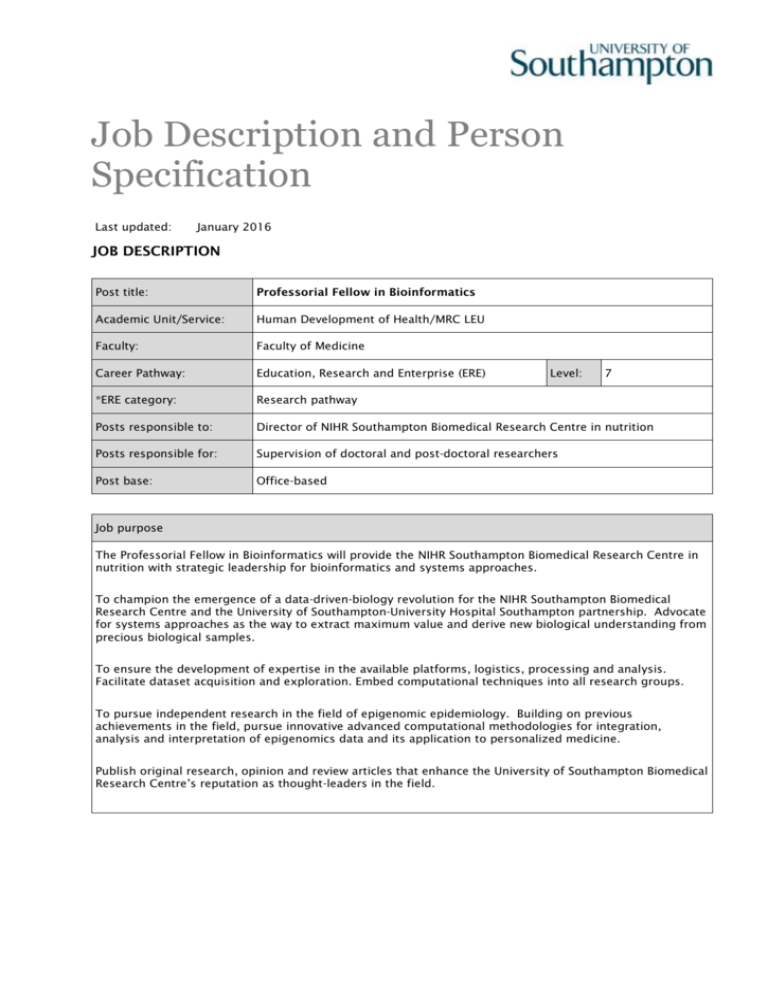
Job Description and Person Specification Last updated: January 2016 JOB DESCRIPTION Post title: Professorial Fellow in Bioinformatics Academic Unit/Service: Human Development of Health/MRC LEU Faculty: Faculty of Medicine Career Pathway: Education, Research and Enterprise (ERE) *ERE category: Research pathway Posts responsible to: Director of NIHR Southampton Biomedical Research Centre in nutrition Posts responsible for: Supervision of doctoral and post-doctoral researchers Post base: Office-based Level: 7 Job purpose The Professorial Fellow in Bioinformatics will provide the NIHR Southampton Biomedical Research Centre in nutrition with strategic leadership for bioinformatics and systems approaches. To champion the emergence of a data-driven-biology revolution for the NIHR Southampton Biomedical Research Centre and the University of Southampton-University Hospital Southampton partnership. Advocate for systems approaches as the way to extract maximum value and derive new biological understanding from precious biological samples. To ensure the development of expertise in the available platforms, logistics, processing and analysis. Facilitate dataset acquisition and exploration. Embed computational techniques into all research groups. To pursue independent research in the field of epigenomic epidemiology. Building on previous achievements in the field, pursue innovative advanced computational methodologies for integration, analysis and interpretation of epigenomics data and its application to personalized medicine. Publish original research, opinion and review articles that enhance the University of Southampton Biomedical Research Centre’s reputation as thought-leaders in the field. Key accountabilities/primary responsibilities % Time 1. Lead, with the Director of the Biomedical Research Centre of Nutrition, on the identification 40 % and development of systems approaches as the way to extract maximum value and derive new biological understanding from precious biological samples. This includes championing the emergence of a data-driven-biology revolution in the University-UHS partnership, ensuring the development of expertise in the available platforms, logistics, processing and analysis, facilitating dataset acquisition and exploration, and embedding computational techniques into all research groups. 2. Pursue independent research in the field of epigenomic epidemiology. Building on previous 30 % achievements in the field, pursue innovative advanced computational methodologies for integration, analysis and interpretation of epigenomics data and its application to personalized medicine. Publish original research, opinion and review articles that enhance the University of Southampton’s reputation as thought-leaders in the field. 3. Formulate strategic plans to translate new research findings to unmet needs in biosciences 20 % with a particular focus on enabling precision medicine and drug discovery. Instigate, develop and lead new activities with Industrial partners. Champion a translational approach within the University-UHS partnership and highlight opportunities to translate academic results to address unmet medical needs. 4. Build international network of opinion-leading multidisciplinary collaborators in advanced 10 % computational technologies and approaches to genomics data and its application to healthy ageing across the lifespan, to ensure University of Southampton is in the leading world group of institutions working in this space. Make this group truly global with a particular focus on building alliances with experts in Asia. Lead internationally competitive programmes including international collaborators. 5. Any other duties as allocated by the line manager following consultation with the post holder. Internal and external relationships Key internal relationships will be between the NIHR Southampton BRC, the University of Southampton (notably the MRC Lifecourse Epidemiology, Human Development and Health Academic Unit and the Centre for Biological Sciences, but also other UoS Institutes, Departments and Faculties, as appropriate). Key external relationships will be with other NIHR Centres/Units, with overseas academic collaborators (notably in Singapore and New Zealand) and with partners in the Pharmaceutical and Food Industry sectors. Special Requirements Ability to travel to international and UK travel, and to take part in out of hours teleconferences Document1ERE Level 7 – Balanced Pathway - Professor 2 PERSON SPECIFICATION Criteria Essential Desirable Qualifications, knowledge and experience PhD and experience in epigenetics and metagenomics. Experience of drug and biomarker discovery research in the industry sector Detailed knowledge of epigenetic epidemiology. A significant national and international reputation in bioinformatics and systems biology, centred on interpretation of biological ‘omics data across multiple dimensions. How to be assessed C.V. Experience in leading industryacademic partnerships Involvement in national and international events and collaborative research A sustained record of excellence in research activities. Experience of influencing strategy and change in a complex environment. Experience of working with clinical observational and interventional cohorts Planning and organising Proven ability to champion and oversee key contributions to University research and enterprise strategies. Proven ability to lead multidisciplinary research activities, grants and/or contracts of national and international importance. Proven ability to lead the development of education strategies through ongoing leadership in the dissemination of knowledge and/or curriculum development. Problem solving and initiative Proven ability to implement successful change management initiatives and formulate strategic plans that reflect and support the priority needs of the faculty and University. Management and teamwork Proven ability to oversee people and resource management processes in order to deliver key education, research and enterprise activities. Proven ability to make a sustained contribution to academic leadership at discipline, academic unit and faculty level. Proven ability to demonstrate leadership abilities in Higher Education and to raise performance standards through own work areas. Proven ability to recognise and deal with obstacles and difficulties so that the team can deliver. Document1ERE Level 7 – Balanced Pathway - Professor 3 Communicating and influencing Proven ability to establish and build major relationships with stakeholders. Proven ability to act as the main figurehead for key activities, developing important national and international contacts. Able to contribute to the development of the University’s profile in the UK and internationally. Proven ability to use influence to develop positions or strategies. Other skills and behaviours Compliance with relevant Health & Safety issues Positive attitude to colleagues and students Special requirements Able to attend national and international conferences as required. Document1ERE Level 7 – Balanced Pathway - Professor 4 JOB HAZARD ANALYSIS Is this an office-based post? ☒ Yes If this post is an office-based job with routine office hazards (eg: use of VDU), no further information needs to be supplied. Do not complete the section below. ☐ No If this post is not office-based or has some hazards other than routine office (eg: more than use of VDU) please complete the analysis below. Hiring managers are asked to complete this section as accurately as possible to ensure the safety of the post-holder. ## - HR will send a full PEHQ to all applicants for this position. Please note, if full health clearance is required for a role, this will apply to all individuals, including existing members of staff. ENVIRONMENTAL EXPOSURES Occasionally Frequently Constantly (<30% of time) (30-60% of time) (> 60% of time) Outside work Extremes of temperature (eg: fridge/ furnace) ## Potential for exposure to body fluids ## Noise (greater than 80 dba - 8 hrs twa) ## Exposure to hazardous substances (eg: solvents, liquids, dust, fumes, biohazards). Specify below: Frequent hand washing Ionising radiation EQUIPMENT/TOOLS/MACHINES USED ## Food handling ## Driving university vehicles(eg: car/van/LGV/PCV) ## Use of latex gloves (prohibited unless specific clinical necessity) ## Vibrating tools (eg: strimmers, hammer drill, lawnmowers) PHYSICAL ABILITIES Load manual handling Repetitive crouching/kneeling/stooping Repetitive pulling/pushing Repetitive lifting Standing for prolonged periods Repetitive climbing (ie: steps, stools, ladders, stairs) Fine motor grips (eg: pipetting) Gross motor grips Repetitive reaching below shoulder height Repetitive reaching at shoulder height Repetitive reaching above shoulder height PSYCHOSOCIAL ISSUES Face to face contact with public Lone working ## Shift work/night work/on call duties Document1ERE Level 7 – Balanced Pathway - Professor 5
